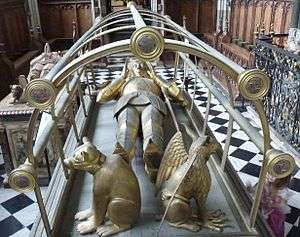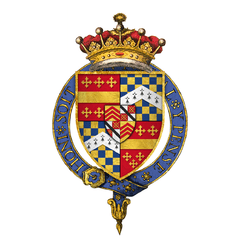Richard Beauchamp, 13th Earl of Warwick
| The Earl of Warwick | |
|---|---|
|
Arms of Sir Richard de Beauchamp, 13th Earl of Warwick, KG, as depicted on his stall plate at St. George's Chapel. | |
| Born |
25 or 28 January 1382 Salwarpe, Worcestershire, England |
| Died |
30 April 1439 (aged 57) Rouen, Normandy, France |
| Spouse(s) |
Elizabeth de Berkeley Lady Isabel le Despenser |
| Issue |
Lady Margaret Beauchamp Lady Eleanor Beauchamp Lady Elizabeth Beauchamp Henry de Beauchamp, 1st Duke of Warwick Lady Anne Beauchamp |
Richard de Beauchamp, 13th Earl of Warwick, Count of Aumale, KG (25 or 28 January 1382[1] – 30 April 1439) was an English medieval nobleman and military commander.
Early life
Beauchamp was born at Salwarpe in Worcestershire,[2] the son of Thomas de Beauchamp, 12th Earl of Warwick, and Margaret, a daughter of William Ferrers, 3rd Baron Ferrers of Groby.[1] His godfather was King Richard II.[2]
He was knighted at the coronation of King Henry IV and succeeded to the Earldom of Warwick in 1401.[3]
Welsh Rebellion
Soon after reaching his majority and taking responsibility for the Earldom, he saw military action in Wales, defending against a Welsh rebellion led by Owain Glyndŵr. On 22 July 1403, the day after the Battle of Shrewsbury, he was made a Knight of the Garter.
In the summer of 1404, he rode into what is today Monmouthshire at the head of a force. Warwick engaged Welsh forces at the Battle of Mynydd Cwmdu, near Tretower Castle a few miles northwest of Crickhowell – nearly capturing Owain Glyndwr himself, taking Owain's banner, forcing the Welsh to flee. They were chased down the valley of the River Usk where they regrouped and turned the tables on the pursuing English force, attempting an ambush. They chased the English in turn to the town walls of Monmouth after a skirmish at Craig-y-Dorth, a conical hill near Mitchel Troy.[4]
Chivalry and Pilgrimage

Warwick acquired quite a reputation for chivalry, and when in 1408 he went on pilgrimage to the Holy Land, he was challenged many times to fight in the sporting combat which was then popular. On the return trip he went through Russia and Eastern Europe, not returning to England until 1410.
Soldier of the King
In 1410, he was appointed a member of the royal council and in 1413 was Lord High Steward at the Prince's coronation as Henry V of England. The next year he helped put down the Lollard uprising, and then went to Normandy as Captain of Calais and represented England at the Council of Constance.[5] He spent much of the next decade fighting the French in the Hundred Years' War. In 1419, he was created Count of Aumale, part of the King's policy of giving out Norman titles to his nobles. He was appointed Master of the Horse.
Responsibilities
Henry V's will gave Warwick the responsibility for the education of the infant Henry VI of England. This duty required him to travel back and forth between England and Normandy many times. In 1437, the Royal Council deemed his duty complete, and he was appointed lieutenant of France and Normandy. He remained in France for the remaining two years of his life.
Marriages and children
Warwick first married Elizabeth de Berkeley (born ca.1386 – 28 December 1422) before 5 October 1397,[6] the daughter of Thomas de Berkeley, 5th Lord Berkeley and Margaret de Lisle, 3rd Baroness de Lisle. Together they had 3 daughters:
- Margaret, Countess of Shrewsbury (1404–1468), who married John Talbot, 1st Earl of Shrewsbury, and whose great-great-grandson John Dudley was created Earl of Warwick and subsequently Duke of Northumberland;
- Eleanor, Duchess of Somerset, (1407-1467) who first married Thomas de Ros, 9th Baron de Ros and then married Edmund Beaufort, 2nd Duke of Somerset;
- Elizabeth, Baroness Latimer of Snape, (1417-1480) who first married George Neville, 1st Baron Latimer, and then married Thomas VI Wake of Blisworth (1435-1476).
Warwick then married Lady Isabel le Despenser (26 July 1400 – 1439), the daughter of Thomas le Despenser, 1st Earl of Gloucester and Constance of York. With Isabel, who was also the widow of his cousin Richard de Beauchamp, 1st Earl of Worcester, his children were:
- Henry de Beauchamp, 1st Duke of Warwick, (born March 1425) who succeeded his father as Earl of Warwick, and later became Duke of Warwick;
- Anne Beauchamp, 16th Countess of Warwick, (b September 1426) who was theoretically Countess of Warwick in her own right (after the death of her niece), and who married Richard Neville, 16th Earl of Warwick.
Death and Burial

Richard de Beauchamp's will was made at Caversham Castle in Oxfordshire (now Berkshire), one of his favoured residences, in 1437. Most of his property was entailed, but with a portion of the rest the will established a substantial trust. After his debts were paid the trust endowed the Collegiate Church of St Mary in Warwick, and called for the construction of a new chapel there. It also enlarged the endowment of the chantries at Elmley Castle and Guy's Cliffe, and gave a gift to Tewkesbury Abbey.[8] Beauchamp died in Rouen, Normandy, two years later, on 30 April 1439.[9] After the completion of the chapel, his body was transferred there (in 1475),[8] where his magnificent gilt-bronze monumental effigy may still be seen.
Ancestors
| Ancestors of Richard Beauchamp, 13th Earl of Warwick | ||||||||||||||||||||||||||||||||||||||||||||||||||||||||||||||||||||||||||||||||||||||||||||||||||||||||||||||||||||||||||||||||||||||||||||||||||||||||||||||||||||||||||||||||||||||||||||||||||||||||||||||||||||||||||||||||||||||||||||||||||||||||||||||||||||||||||||||||||||||||||||||||||||||||||||||||||||||||||||||||||||||||||||||||||||||||||||||||||||||||||||||||||||||||||||||||||||||||||||||||||||||||||||||||||||||||||||||||||||||||||||||||||||||||||||||||||||||||||||||||||||||||||||||||||||||||||||||||||
|---|---|---|---|---|---|---|---|---|---|---|---|---|---|---|---|---|---|---|---|---|---|---|---|---|---|---|---|---|---|---|---|---|---|---|---|---|---|---|---|---|---|---|---|---|---|---|---|---|---|---|---|---|---|---|---|---|---|---|---|---|---|---|---|---|---|---|---|---|---|---|---|---|---|---|---|---|---|---|---|---|---|---|---|---|---|---|---|---|---|---|---|---|---|---|---|---|---|---|---|---|---|---|---|---|---|---|---|---|---|---|---|---|---|---|---|---|---|---|---|---|---|---|---|---|---|---|---|---|---|---|---|---|---|---|---|---|---|---|---|---|---|---|---|---|---|---|---|---|---|---|---|---|---|---|---|---|---|---|---|---|---|---|---|---|---|---|---|---|---|---|---|---|---|---|---|---|---|---|---|---|---|---|---|---|---|---|---|---|---|---|---|---|---|---|---|---|---|---|---|---|---|---|---|---|---|---|---|---|---|---|---|---|---|---|---|---|---|---|---|---|---|---|---|---|---|---|---|---|---|---|---|---|---|---|---|---|---|---|---|---|---|---|---|---|---|---|---|---|---|---|---|---|---|---|---|---|---|---|---|---|---|---|---|---|---|---|---|---|---|---|---|---|---|---|---|---|---|---|---|---|---|---|---|---|---|---|---|---|---|---|---|---|---|---|---|---|---|---|---|---|---|---|---|---|---|---|---|---|---|---|---|---|---|---|---|---|---|---|---|---|---|---|---|---|---|---|---|---|---|---|---|---|---|---|---|---|---|---|---|---|---|---|---|---|---|---|---|---|---|---|---|---|---|---|---|---|---|---|---|---|---|---|---|---|---|---|---|---|---|---|---|---|---|---|---|---|---|---|---|---|---|---|---|---|---|---|---|---|---|---|---|---|---|---|---|---|---|---|---|---|---|---|---|---|---|---|---|---|---|---|---|---|---|---|---|---|---|---|---|---|---|---|---|---|---|---|---|---|---|---|---|---|---|---|---|---|---|---|---|---|---|---|---|---|---|---|---|---|---|---|---|---|---|---|---|---|---|---|---|---|---|---|---|---|---|---|---|---|---|---|---|---|---|---|---|---|---|---|---|---|---|---|---|---|---|---|---|---|---|---|---|---|---|---|---|---|---|---|---|---|---|---|---|---|---|---|---|---|---|---|---|---|---|---|
| ||||||||||||||||||||||||||||||||||||||||||||||||||||||||||||||||||||||||||||||||||||||||||||||||||||||||||||||||||||||||||||||||||||||||||||||||||||||||||||||||||||||||||||||||||||||||||||||||||||||||||||||||||||||||||||||||||||||||||||||||||||||||||||||||||||||||||||||||||||||||||||||||||||||||||||||||||||||||||||||||||||||||||||||||||||||||||||||||||||||||||||||||||||||||||||||||||||||||||||||||||||||||||||||||||||||||||||||||||||||||||||||||||||||||||||||||||||||||||||||||||||||||||||||||||||||||||||||||||
Notes
- 1 2 Christine Carpenter, ‘Beauchamp, Richard, thirteenth earl of Warwick (1382–1439)’, Oxford Dictionary of National Biography, Oxford University Press, 2004.
- 1 2 Richard Gough, Description of the Beauchamp chapel, adjoining to the church of St. Mary, at Warwick. And the monuments of the earls of Warwick, in the said church and elsewhere (Warwick Town, St Mary, 1803), p. 17
- ↑ John Ashdown-Hill, "Eleanor the Secret Queen", (The History Press, 2009, ISBN 978-0-7524-5669-0), p. 23
- ↑ Ian Mortimer, "Henry IV: The Self-made King"
- ↑ John Ashdown-Hill, "Eleanor The Secret Queen", Page 24 The History Press, 2009 ISBN 978-0-7524-5669-0
- ↑ Lundy, Darryl. "thePeerage.com - Person Page 10166". thePeerage.com. Retrieved 13 November 2011.
- ↑ Encyclopaedia Britannica, 9th.ed., vol 21, p.559-60, Sculpture
- 1 2 Hicks, Michael (November 1981). "The Beauchamp Trust, 1439-87". Historical Research Volume 54 Issue 130. Wiley Online Library. pp. 135–149. Retrieved 6 November 2011.
- ↑ Tompsett, Brian. "de Beauchamp, Richard of Warwick, Earl of Warwick 13th". Royal Genealogical Data. Retrieved 6 November 2011.
References
-
 Gairdner, James (1885). "Beauchamp, Richard de (1382-1439)". In Stephen, Leslie. Dictionary of National Biography. 4. London: Smith, Elder & Co.
Gairdner, James (1885). "Beauchamp, Richard de (1382-1439)". In Stephen, Leslie. Dictionary of National Biography. 4. London: Smith, Elder & Co. - Hicks, Michael (1981). "The Beauchamp Trust, 1439-87". Historical Research. 54 (130): 135–149. doi:10.1111/j.1468-2281.1981.tb01223.x. reprinted in Richard III and His Rivals.
- Lundy, Darryl. "Peerage.com on Elizabeth de Berkeley". The Peerage.
- Lundy, Darryl. "Peerage.com on Richard de Beauchamp". The Peerage.
| Peerage of England | ||
|---|---|---|
| Preceded by Thomas de Beauchamp |
Earl of Warwick 1401–1439 |
Succeeded by Henry de Beauchamp |
